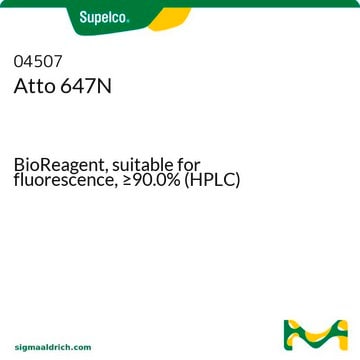93711
Atto 655
BioReagent, suitable for fluorescence, ≥85% (HPLC)
About This Item
Recommended Products
product line
BioReagent
Quality Level
Assay
≥85% (HPLC)
form
powder
manufacturer/tradename
ATTO-TEC GmbH
transmittance
254 nm
655 nm
fluorescence
λex 655 nm; λem 680 nm in 0.1 M phosphate pH 7.0
λ
in ethanol (with 0.1% trifluoroacetic acid)
UV absorption
λ: 652-658 nm Amax
suitability
suitable for fluorescence
storage temp.
−20°C
InChI
1S/C27H33N3O6S/c1-4-29-9-5-7-17-11-20-24(13-22(17)29)36-25-14-23-19(12-21(25)28-20)18(16-37(33,34)35)15-27(2,3)30(23)10-6-8-26(31)32/h11-14,18H,4-10,15-16H2,1-3H3,(H-,31,32,33,34,35)
InChI key
FOYVTVSSAMSORJ-UHFFFAOYSA-N
Looking for similar products? Visit Product Comparison Guide
Application
Atto 655 shows a molar extinction of 110,000 and QY of 30% in water (50% in ethanol). Decay time is 1.9 ns.
Other Notes
Storage Class Code
11 - Combustible Solids
WGK
WGK 3
Flash Point(F)
Not applicable
Flash Point(C)
Not applicable
Personal Protective Equipment
Certificates of Analysis (COA)
Search for Certificates of Analysis (COA) by entering the products Lot/Batch Number. Lot and Batch Numbers can be found on a product’s label following the words ‘Lot’ or ‘Batch’.
Already Own This Product?
Find documentation for the products that you have recently purchased in the Document Library.
Customers Also Viewed
Articles
Fluorescence lifetime measurement is advantageous over intensity-based measurements. Applications include fluorescence lifetime assays, sensing and FLI.
Fluorescence lifetime measurement is advantageous over intensity-based measurements. Applications include fluorescence lifetime assays, sensing and FLI.
Fluorescence lifetime measurement is advantageous over intensity-based measurements. Applications include fluorescence lifetime assays, sensing and FLI.
Fluorescence lifetime measurement is advantageous over intensity-based measurements. Applications include fluorescence lifetime assays, sensing and FLI.
Our team of scientists has experience in all areas of research including Life Science, Material Science, Chemical Synthesis, Chromatography, Analytical and many others.
Contact Technical Service




